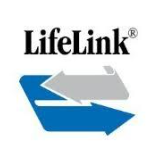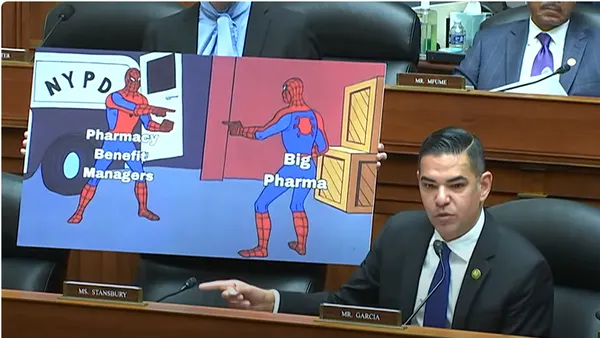Dive Brief:
- CVS has won a new pharmacy benefit manager contract with one of the biggest healthcare buyers in the nation, the California Public Employees’ Retirement System.
- With the five-year contract award, CVS Caremark has unseated UnitedHealth’s Optum Rx, which has managed CalPERS’ prescription drug benefit since 2017.
- Financial terms of the contract were not disclosed. However, CVS has agreed to put $250 million at risk, contingent on the PBM controlling drug costs and improving the health of CalPERS members.
Dive Insight:
The new PBM contract, which kicks off in January 2026, was designed to control the rising costs of prescription drugs — a growing concern for CalPERS, the largest pension fund in the U.S.
CalPERS’ total outpatient pharmacy spend reached almost $2.4 billion in 2023, up 36% from just three years prior. Drug costs are now eating up more than one-fifth of the fund’s healthcare premiums, according to CalPERS documents.
Those numbers are for all of CalPERS’ members, not the smaller slice that’s captured in this contract, which covers outpatient prescription drug benefits for roughly 587,000 members enrolled in both non-Medicare and Medicare HMO and PPO plans. That represents about 40% of the 1.5 million people who receive health benefits through CalPERS.
Still, the contract covers a major chunk of CalPERS’ drug spending. A spokesperson declined to provide additional details on the financial terms of its agreement with CVS, but CalPERS’ previous contract with Optum Rx was valued at $5 billion. The pension fund budgeted $19 million for PBM administrative fees in its most recent fiscal year alone.
The contract, though sizable, is likely immaterial to CVS’ earnings. But it moves the company in a positive direction as it struggles with rising spending in health benefits, stabilizing its retail pharmacy business and a barrage of regulatory and legislative scrutiny of its PBM, according to Michael Cherny, an analyst with Leerink Partners.
“No one PBM contract is ever that big a deal in the grand scheme of things, but a win is a win. And CVS winning CalPERS, which it lost in 2017, doesn’t hurt at all,” Cherny wrote in a note Tuesday.
CalPERS declined to comment on other bidders for the contract and how their bids compared to CVS’. But the fund elected to part ways with Optum Rx after determining it may not be getting the full benefits of rebates in what was supposed to be an 100% pass-through contract. CalPERS also wanted more transparency and clinical and financial accountability from its PBM, according to CalPERS chief clinical director Dr. Julia Logan.
“There are areas of the contract that we believe we can and should improve upon,” Logan said in a June meeting of CalPERS’ administrative board, according to a transcript.
In a July presentation on the vendor search, CalPERS said CVS was “found to be the strongest candidate” based on its “strong financial offer for Basic and Medicare,” along with its solid transition and implementation plan, and alignment on contract terms.
“CVS had the best and most credible financial offer,” with “substantially better” rebates and prices on drugs, the presentation reads.
In a Tuesday release on the deal, CalPERS added that CVS also won out over other vendors because it committed to increased audit and oversight provisions, along with performance guarantees putting $250 million at risk if CVS doesn’t reach cost and quality targets.
Clinical guarantees include improving outcomes for patients with high blood pressure and diabetes. As for cost, CVS has agreed to keep drug cost trend to 6.5% over the five years of the contract period, according to CalPERS documents.
For context, employers’ prescription drug costs jumped 8% last year alone, according to a Mercer survey.
“By holding the PBM accountable for delivering results, we’re aligning their interests with those of our members and their public sector employers,” Don Moulds, CalPERS’ chief health director, said in a statement. “This contract is designed to ensure that every dollar spent on prescription drugs delivers value for our members and ensures the sustainability of our program.”
Prescription drug access should remain essentially the same for CalPERS members, the fund said. However, there could be some disruption, as the July presentation says CVS’ formulary is “tighter” though clinically appropriate.
Roughly 15% of the fund’s Medicare members and 5% of its non-Medicare members may have to change medication, according to the documents.
Ed DeVaney, the president of CVS Caremark, said the company is “honored” to win the contract in a statement.
“We are committed to building a strong, collaborative relationship with CalPERS to deliver affordable coverage and expand access to high-quality health care for their plan members,” DeVaney said.
PBMs, which negotiate rebates on drugs with pharmaceutical companies, administer drug benefits for health plans and reimburse pharmacies for dispensing medications, say they’re indispensable for controlling snowballing drug costs. However, employers and plans say they’re increasingly fed up with certain business practices of major PBMs that could be hiding where their money goes, while inflating the price of drugs.
The desire for alternatives has given rise to a crop of younger, smaller PBMs that say they’re more transparent and paid more simply than the legacy players.
Still, CalPERS awarding the contract to CVS shows the difficulty of deposing the Big Three — Caremark, Optum Rx and Cigna’s Express Scripts — which jointly control 80% of the U.S. prescription drug market.













